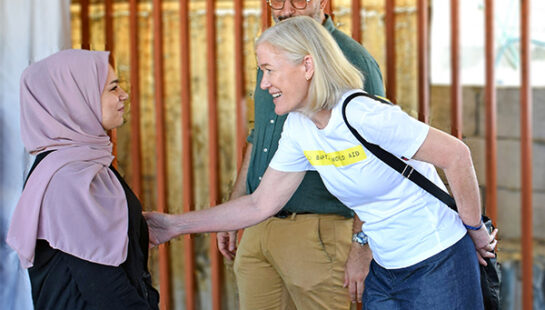Sometimes things don’t happen the way you’re expecting them to.
It was a Tuesday in mid-March 2020. Eleven months of planning and dreaming (and paying for) my dream wedding was about to come to fruition in just a few short days. Until I got a call from the wedding venue. “The government is about to announce that gatherings of over one hundred people are banned.” the voice said, “I’m sorry, you’ll have to cancel.”
By some miracle, and with the help of family and friends, we still got married that weekend but not the way we had planned, dreamed or expected. It was a wild swing away from a long-held expectation.
For first-century Jews. Jesus was not what they’d been expecting. We read in John 12:12-19, the story of Jesus entering Jerusalem on a donkey. A day we’ve come to celebrate as Palm Sunday. This is an iconic moment in the biblical narrative. A groundswell is building for Jesus, people are following him, they’re treating him like a King on a royal procession and they’re overjoyed that the Messiah they’ve been waiting for is here.
So why do things change so dramatically from ‘Hosanna’ (meaning ‘pray’ or ‘save us’ in Hebrew), to ‘Crucify him’ in a matter of days?
An Example Of Unmet Expectations
Israel had been waiting generations for their Messiah to come and deliver them and as they waited, and hoped, Prophets declared that the Messiah would:
- Be a descendant of David
- Reign on the throne
- Rule with righteousness and Justice
- Set the nations free
- Establish his kingdom
- Rule over Israel
- Shepherd Israel
- Crush all opposition under his feet.
So, the crowd lined the streets and cheered for their long-expected King of Israel, but applying their own expectations to those prophesies meant they were hoping for a ‘political’ king to lead them to a military victory against Rome and provide peace and prosperity for Israel.
Jesus could have done that, but he had bigger plans.
The people of Israel were blinded by their present need for deliverance that they missed the new life, the bigger thing that Jesus was ushering in and inviting them into.
Keeping The Main Thing, The Main Thing
Sometimes we get caught up and miss the main thing.
During those eleven months of wedding planning, so many people had tried to remind me not to get caught up in the glamour of the wedding day and to remember what it was all about—the beginning of a marriage. But even still, I meticulously chose the flowers, and argued with my mum about who she could or couldn’t invite. Until the rug was pulled from under my feet, all that was left was the main thing—will we or won’t we be able to get married?
The first-century Jews were so caught up in the prospect of a Messiah who would crush their earthly oppressors and rule over Israel; they weren’t as interested in a Messiah who’d come to crush the opponent of sin, and rule over every aspect of their hearts.
So they end up disappointed and the crowd turns from worshipping Jesus to calling for his execution. This crowd was following Jesus for the wrong reasons.
Don’t get me wrong, Jesus cared—and cares—about the here and now. He ushered in the Kingdom of God in the present moment, he met people’s immediate needs, he healed the sick, fed the hungry, brought close the marginalised and raised people from the dead. But that wasn’t the main event—they were windows into the main thing, the eternal thing.
This scene is often referred to as the triumphant entry. And it was triumph but not the triumph of Israel over their oppressors. Their King hadn’t arrived on a war horse. Instead, their servant saviour came on a donkey.
It’s the triumph of humility over pride and worldly success, on its way to triumph over sin and death.
Seeing Through God’s Eyes
What really struck me and challenged me about this story is that when we come to worship Jesus with our own idea of what the world is meant to look like and be like, we miss the opportunity to see it through God’s eyes.But we need Jesus’ kingdom to be ushered in, not our own.
It turned out that my thrown-together-in-three-days wedding with only the main things, was more than enough. The kingdom of God isn’t about what I want, it’s about what God wants, and that’s going to be infinitely better. It’s easy to judge these first Century Jews for missing the point so catastrophically. But I’ve no doubt there are plenty of things I’m missing the point on every day in my attempts to follow Jesus.
But thankfully, there is grace. And there is resurrection, and there’s always the invitation to try again.
As I reflect after Easter I’m asking Jesus to remind me, what kingdom did he come to establish? And how do I be a part of that?



 Robbie Townsend,
Robbie Townsend,

 Baptist World Aid
Baptist World Aid